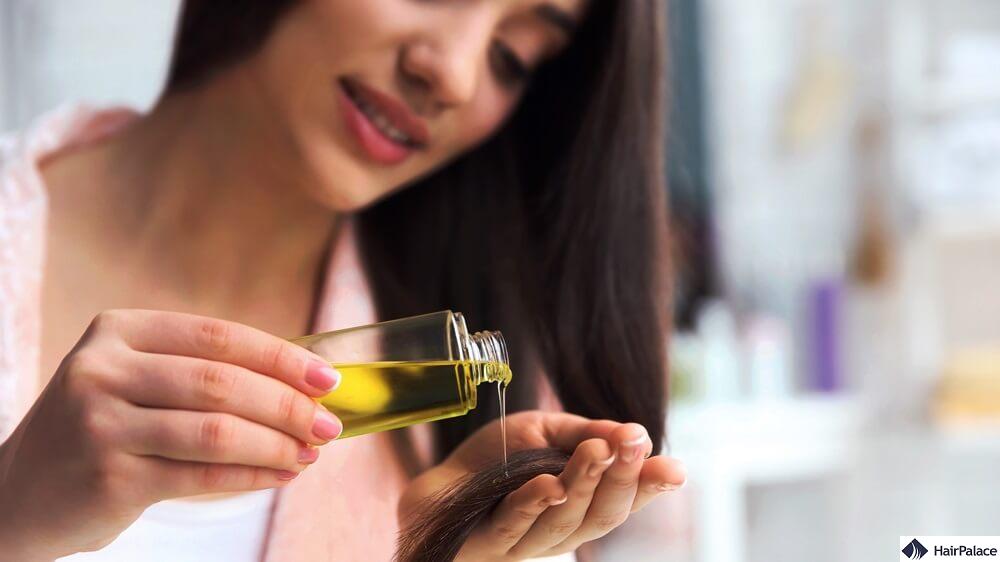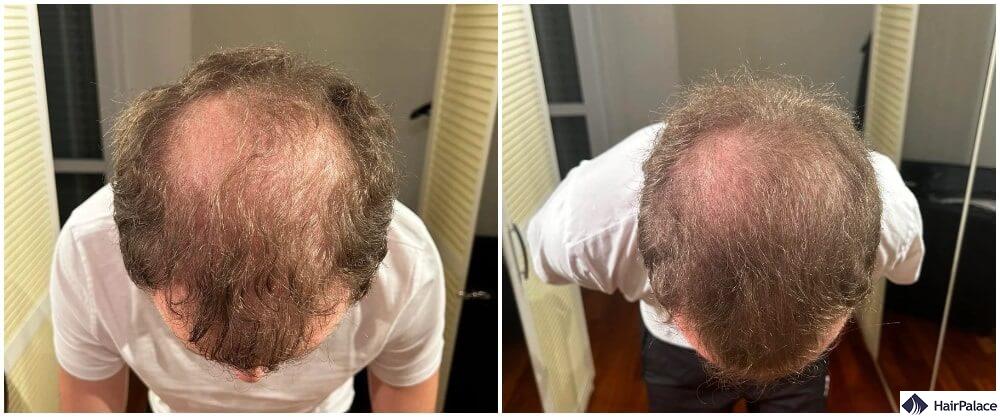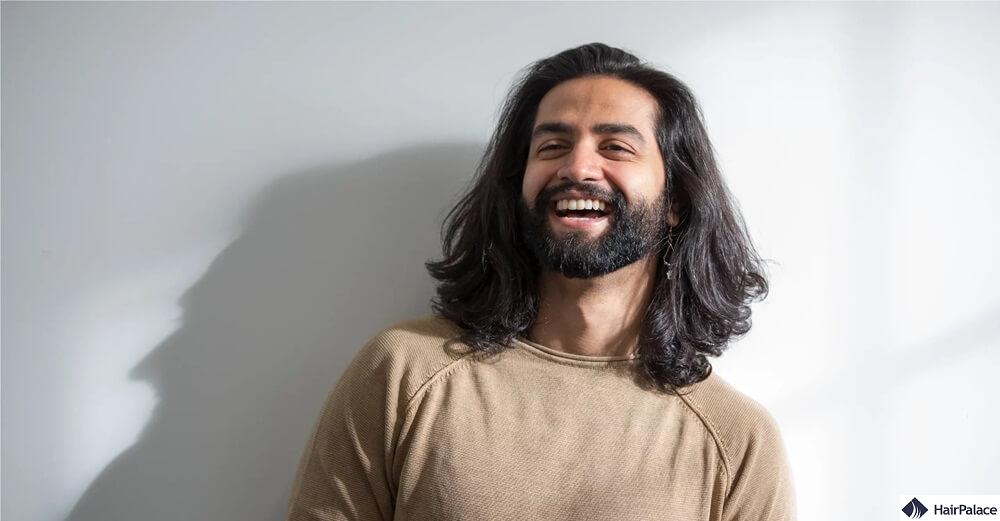Olive Oil for Hair: Does it Work?

Olive oil has been a beauty staple for centuries, renowned for its nourishing properties and versatility.
It’s called liquid gold by many in the beauty industry and it’s easy to see why.
From hydrating dry strands to adding a luxurious shine, it’s often touted as a miracle solution for various hair concerns.
But does it truly live up to the hype regarding hair care?
In this article, we’ll explore the benefits, potential risks, and the science behind using olive oil for healthier, stronger hair to help you decide if it’s the right remedy.
- Is olive oil good for hair?
- How does olive oil help hair growth?
- Olive oil on hair before and after
- How to apply
- Benefits
- Risks
- Does the type of olive oil matter?
Is olive oil good for hair?

Olive oil treatment is good for hair. Its natural emollient properties help moisturize and nourish the scalp, reducing dryness and flakiness.
Rich in antioxidants, vitamins E and K, and fatty acids, olive oil strengthens hair follicles, preventing breakage and thinner hair.
It can also add shine and softness to the hair, making it more manageable.
Regular use may even promote healthier hair growth by improving blood circulation in the scalp and reducing oxidative stress.
Applying olive oil as a conditioning treatment or incorporating it into a DIY hair mask can greatly improve your overall hair health.
How does olive oil help hair growth?
Olive oil for hair may promote growth indirectly by creating a healthy environment for hair growth.
Similarly to marula oil and other essential oils, it can greatly improve scalp health in certain cases.
Here’s how it can contribute to healthier, stronger hair that may grow more effectively:
1. Improves Scalp Health
Olive oil contains anti-inflammatory properties that can soothe irritation on the scalp and promote a healthy environment for hair follicles to thrive.
A well-nourished scalp is essential for consistent hair growth.
2. Reduces Hair Breakage
The moisturizing properties of such hair care products strengthen the hair shaft, reducing breakage and split ends.
This allows hair to grow longer without breaking off.
3. Increases Blood Circulation
Massaging it into the scalp can improve blood flow to hair follicles, ensuring they receive more nutrients and oxygen to support growth.
4. Provides Antioxidant Protection
It is rich in antioxidants like vitamin E, which protect hair and scalp from damage caused by free radicals, environmental stress, and ageing.
Healthier hair is less likely to fall out prematurely.
5. Prevents DHT Accumulation
Dihydrotestosterone (DHT) is a hormone linked to hair loss.
While more research is needed, some evidence suggests that it might reduce DHT buildup on the scalp, which could slow hair loss and encourage new growth.
6. Strengthens Hair Follicles
The fatty acids and vitamins provide essential nutrients to hair follicles, improving their strength and resilience over time.
7. Moisturizes and Conditions
Olive oil provides extra moisture to dry, brittle hair and prevents damage caused by environmental factors, heat styling, or chemical treatments. Healthy, moisturized hair is more likely to grow well.
Olive oil on hair before and after

How to apply olive oil on hair
Here are the best ways to apply it for shiny hair and improved hair growth:
- Warm Oil Treatment: Warm olive oil slightly and massage it into the scalp for 10–15 minutes. Leave it on for at least 30 minutes or overnight, then rinse and shampoo.
- Mix with Growth-Boosting Ingredients: Combine it with castor oil, which is also known to promote hair growth. Add essential oils like rosemary or peppermint for enhanced circulation.
- Regular Conditioning: Apply it as a deep conditioner once a week to keep hair healthy and reduce breakage.
The main benefits of olive oil for hair

Olive oil offers several significant benefits for hair, making it a popular natural remedy for hair care.
Here are the main olive oil for hair benefits:
- Deep Moisturization: It acts as a natural emollient, hydrating dry and damaged hair, and restoring its natural moisture balance.
- Strengthens Hair: Rich in antioxidants, vitamins (E and K), and essential fatty acids, olive oil fortifies the hair shaft, reducing breakage and preventing split ends.
- Improves Scalp Health: Its anti-inflammatory and antibacterial properties help soothe irritation, combat dandruff, and maintain a healthy scalp environment.
- Enhances Shine and Softness: Smoothens the hair cuticle, adding a natural shine and softness to dull or rough hair.
- Promotes Hair Growth: By improving blood circulation to the scalp and nourishing the follicles, it supports healthier and potentially faster hair growth.
- Reduces Frizz: Tames flyaways and frizz by sealing in moisture, making hair more manageable and smooth.
Risks of using olive oil for hair
While olive oil is generally beneficial for hair, there are some potential risks or drawbacks to consider:
- Greasiness: It is heavy and can leave hair feeling greasy or weighed down, especially if overused or if you have fine hair or an oily scalp.
- Difficult Removal: Washing it out of the hair may require multiple shampoo applications, potentially leading to dry hair if not done carefully.
- Clogged Scalp Pores: For those prone to scalp acne or excessive oiliness, olive oil may clog pores, causing irritation or worsening scalp conditions.
- Allergic Reactions: Though rare, some people may experience an allergic reaction to olive oil, resulting in redness, itching, or a rash on the scalp or skin.
- Suitability for Certain Hair Types: Thick or curly hair may benefit more from olive oil than fine or straight hair, which can appear limp and oily after application.
- Interaction with Color-Treated Hair: Hair oils might strip or alter certain types of hair dye, particularly if used immediately after coloring.
- Risk of Attracting Dirt: Leftover oil residue can attract dust and dirt, leading to buildup if not thoroughly rinsed out.
Does the type of olive oil matter?

The type of olive oil matters for hair care, as its quality and processing significantly affect its benefits.
Extra virgin olive oil (EVOO) yields the best results because it is the least processed.
It is often cold-pressed, ensuring no nutrients are lost during extraction retaining high levels of vitamins, antioxidants, and fatty acids that nourish and strengthen hair.
Virgin olive oil is a good alternative, though slightly less nutrient-rich.
Refined oil, on the other hand, undergoes more processing, losing much of its beneficial properties, making it less effective for hair.
Similarly, olive oil blends should be cautiously approached, as they may contain additives or other oils that reduce their efficacy and can cause irritation.
For optimal results, always choose pure, high-quality extra virgin or organic olive oil, as these options provide the most nourishment and are free from harmful chemicals or pesticides.
Last medically reviewed on December 20th, 2024
- Oh JY, Park MA, Kim YC. Peppermint Oil Promotes Hair Growth without Toxic Signs. Toxicol Res. 2014 Dec;30(4):297-304. doi: 10.5487/TR.2014.30.4.297. PMID: 25584150; PMCID: PMC4289931.https://www.ncbi.nlm.nih.gov/pmc/articles/PMC4289931/
- Panahi Y, Taghizadeh M, Marzony ET, Sahebkar A. Rosemary oil vs minoxidil 2% for the treatment of androgenetic alopecia: a randomized comparative trial. Skinmed. 2015 Jan-Feb;13(1):15-21. PMID: 25842469.https://pubmed.ncbi.nlm.nih.gov/25842469/
- Lee BH, et al. (2016). Hair growth-promoting effects of lavender oil in C57BL/6 Mice. DOI:https://dx.doi.org/10.5487/TR.2016.32.2.103
- Kumari KMU, Yadav NP, Luqman S. Promising Essential Oils/Plant Extracts in the Prevention and Treatment of Dandruff Pathogenesis. Curr Top Med Chem. 2022;22(13):1104-1133. doi: 10.2174/1568026622666220531120226. PMID: 35642120.https://pubmed.ncbi.nlm.nih.gov/35642120/
- Gorzynik-Debicka M, et al. (2018). Potential health benefits of olive oil and plant polyphenols. DOI:https://dx.doi.org/10.3390/ijms19030686
- Omar SH. (2010). Oleuropein in olive and its pharmacological effects. DOI:https://dx.doi.org/10.3797/scipharm.0912-18


